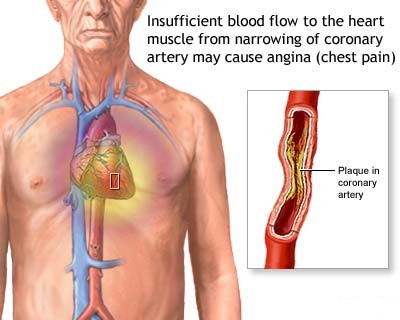Chest pain sufferers see a whole new meaning in Hawthorne’s The Scarlet Letter. For you, the red that burns the breast stands for Angina.
Angina is the likely culprit behind your chest pain if it isn’t a heart attack or heartburn. Coronary artery disease causes angina, and the pain is a sign that your heart isn’t getting enough blood (and hence not enough oxygen).
You can have angina when you are resting, but too much stress, too much to eat, or too much exercise usually trigger an attack. Your heart should be able to handle the added demand, but it can’t when the arteries that lead to your heart are clogged (atherosclerosis). The blood circulation to your heart is enough for normal needs, but not enough when the needs increase, such as when you are running after a grandchild.

Here’s what to do right away to reduce the pain:
- Nix pain with nitroglycerin. Nitroglycerin expands your blood vessels and can ease pain within seconds. Make sure you always have the chest ointment or the under-the-tongue tablets with you. If you know an angina attack is on the way (like before sex), you may want to go ahead and take a tablet. Ask your doctor for details about how much to take and when.
- If it hurts, don’t do it. An annoying old gag, but good advice. You know what triggers your pain. Don’t sprint after the bus; wait for the next one. Don’t stuff yourself at dinner; save the dessert for later. When a remark makes your blood boil, count to 10 and live above the fray.
- Decline the second glass of wine. Too much alcohol raises your heart rate. That can bring on an attack.
- The long-range plan for angina
- Angina can be painful, but it does have a positive side. Unlike a heart attack, it doesn’t cause permanent damage to your heart. And because the pain serves as a warning, people with angina tend not to have heart attacks, even though their risk is high. They don’t overdo it, like a person with no built-in warning system might.
- But because angina is the result of clogged arteries, it is undoubtedly a signal of heart disease. An attack can cause irregular heartbeat, which is occasionally fatal. Here’s what you need to do to permanently reduce your risk of angina:
- Get out of your recliner — nothing’s finer for angina. Regular exercise will prevent angina attacks caused by overexertion. Your heart actually grows more blood vessels to provide more blood to your heart. Activity only triggers angina if it’s more than your heart is used to handling. Warm up indoors by walking in place or doing calisthenics before exercising in cold weather.
- Sign a pact to stop smoking. Smoking brings on angina for numerous reasons: Nicotine raises your blood pressure. Carbon monoxide in your bloodstream reduces the amount of oxygen your blood can carry. Cigarette smoke makes your blood stickier and more likely to clot.
- Strive for inner peace. Stress can immediately trigger an angina attack and raise your risk of heart disease over the long term. We bring most of our everyday stress on ourselves. We choose how we react to bad traffic, a bad boss, and bad news. People with ill family members, difficult marriages, and high-pressure careers must learn stress management and get outside help when they need it. Prayer, short walks, listening to your favorite self-help guru, and relaxation tapes can all de-stress your life.
- Lower high blood pressure. The lower your blood pressure, the lighter your heart’s workload, and the less oxygen it needs. Eat a low-fat, high-fiber, low-salt diet; take your prescription blood pressure medicine; and avoid over-the-counter drugs (like decongestants) that raise your heart rate and blood pressure.

- Take the weight off. Many overweight people find their angina disappears after shedding a few pounds.
- When you first experience chest pain, you need to visit your doctor, if not immediately call for an emergency rescue service. After you’ve been diagnosed with angina, report back to your doctor when you experience:
- Unusual or severe pain.
- Pain that lasts longer than usual or is unrelieved by nitroglycerin.
- Pain at a lower level of exertion than usual. For instance, walking fast on level ground now brings on an attack, and previously it took climbing a steep hill to bring on pain.
- Pain that wakes you up at night.
- These are all signs of unstable angina, which you should take seriously since it can lead to a heart attack.
- If you can, see your pain as a plus. Your heart has cried out its warning, and now you can make the critical lifestyle choices — diet, exercise, smoking, and stress — that will give you cardiac health and a long, productive life.